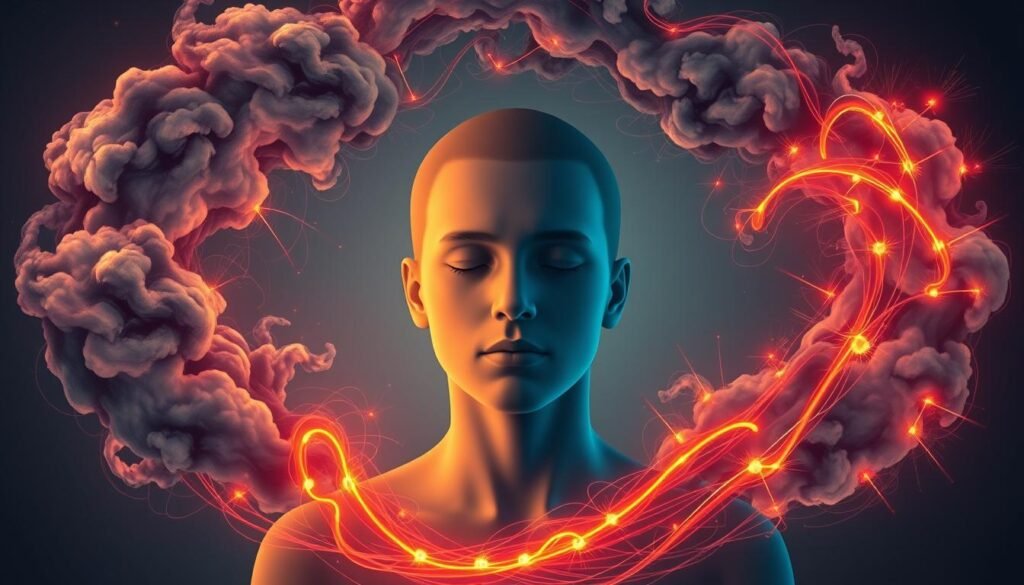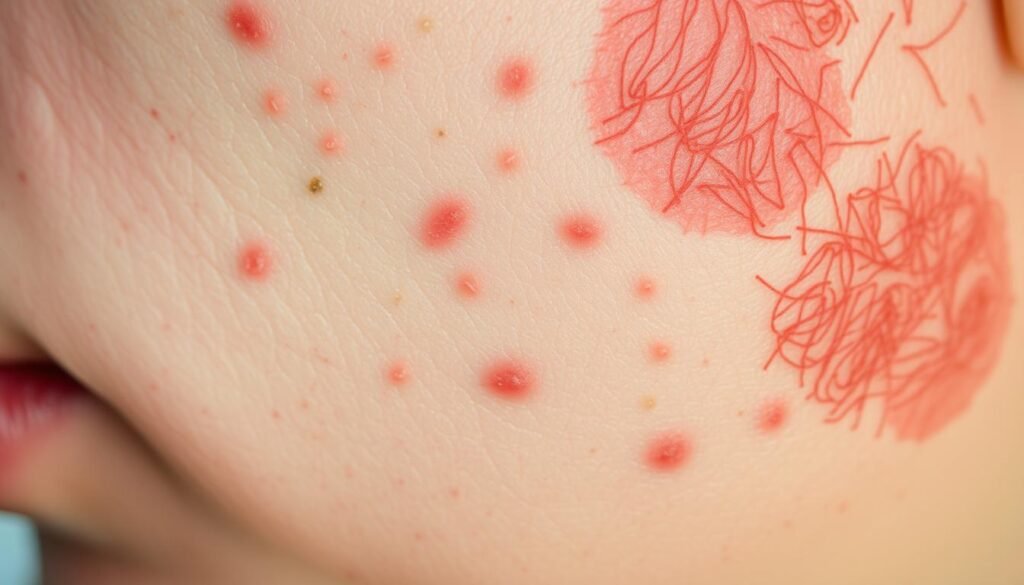Did you know that anxiety disorders affect 40 million adults in the United States every year? This fact shows the deep impact anxiety has on people. Anxiety doesn’t just affect the mind; it also leads to physical symptoms like itching. The connection between mind and body can make stress and skin irritation worse. This impacts life quality a lot.
Studies show that skin conditions like atopic dermatitis and psoriasis are linked to more itching and anxiety. When stressed, the body can show this through the skin, making conditions worse. So, it’s vital to understand this connection to treat and manage anxiety and itching well. In this article, we’ll look at these relationships and suggest ways to ease discomfort and worry.
Key Takeaways
- Anxiety disorders impact millions and are often physically manifested through symptoms like itching.
- Physical conditions such as atopic dermatitis and psoriasis can exacerbate anxiety symptoms.
- Research highlights the bidirectional relationship between anxiety and various skin irritations.
- Understanding the mind-body connection is crucial for effective treatment strategies.
- Self-help and medical approaches can alleviate both anxiety and its accompanying symptoms.
- Stress management is vital in controlling itch-related issues linked to anxiety.
The Mind-Body Connection: An Overview
The mind and body are closely linked. Emotional health impacts our physical well-being. Stress, for example, can lead to skin problems.
Stress activates our endocrine, neurologic, and immune systems. This shows how our feelings affect our bodies. Conditions like atopic dermatitis and psoriasis get worse because of stress. It increases inflammation and itching. Knowing this helps us see health in a fuller way.
Mind-body therapies like meditation can help with skin diseases. They improve our mental and physical health. This connection between our emotions and bodily symptoms is key. As stress remains a big problem, it’s clear we need treatments that cover both aspects. Research shows this approach really helps people feel better.
What is Anxiety?
Anxiety is a mental health issue that brings on a lot of worry, restlessness, and fear. It comes in different types, like generalized anxiety disorder (GAD), panic attacks, and social anxiety. People dealing with anxiety may see it disrupt their daily lives, leading to more serious issues. They might feel emotional upset or have physical reactions, such as a fast heartbeat or sweating. Interestingly, anxiety can also show up as physical feelings, like itching.
There’s a strong link between anxiety and physical symptoms. Our brain processes the feeling of itchiness by using parts that deal with sensation, movement, and emotions. Long-term stress can make inflammation and itchiness worse. This happens because our body gets less responsive to cortisol, a hormone that fights inflammation. This shows how anxiety affects both our minds and bodies.
An ongoing loop of itchiness and anxiety often happens, making both issues more intense. This is especially true for women between 30 to 45 years old. It’s not too uncommon for itching to stem from psychological reasons. This type of itching can also be linked with other mental health challenges, causing even more discomfort.
Some ways to handle anxiety include medical treatments and psychological methods, like cognitive behavioral therapy (CBT), which can also reduce itchiness. Knowing the connection between anxiety and physical symptoms can help in treating them better. For more advice on dealing with anxiety-related itching and to find coping methods for mental health, check out more information here.
Understanding Itching: A Sensory Phenomenon
Itching, or pruritus, is a complex sensory experience. It triggers different responses in our bodies and minds. Unlike pain, which warns us of harm, itching makes us want to scratch.
Around 15% of people deal with chronic itching. This affects their life quality. An itch becomes chronic if it lasts more than six weeks, presenting big challenges.
There are various types of itching. These include neurogenic, neuropathic, pruritoceptive, and psychogenic. Each has a different cause. Some individuals may feel more intense itching due to central sensitization in the nervous system.
Research highlights an emotional link to itching. For example, Gil Yosipovitch found that 82% of people with atopic dermatitis felt itchier after seeing others scratch. It shows how our social environment can affect our sensation of itching.
Chronic itch often leads to shame, anxiety, and depression. This forms a vicious cycle. Stress makes the itch worse, leading to more scratching.
Scratching gives temporary relief by distracting the brain with pain signals. It also releases serotonin, making us feel good. But, understanding the emotional and psychological sides of itching is crucial. This can help us find better treatments for those suffering.
Anxiety and Itching: The Vicious Cycle
Many people struggle with the link between anxiety and itching. It creates a hard cycle that impacts their lives. Stress causes itching, which makes anxiety worse. This two-way street makes treating chronic itch conditions tough. It feels like a loop that can’t be broken.
How Stress Triggers Itching
Stress kickstarts itching by activating the stress response system in our bodies. This system increases cortisol, making us more sensitive to itching. Thus, stress makes itch conditions worse, like atopic dermatitis and psoriasis. When people scratch because of the itch, their anxiety goes up. This traps them in a tough cycle.
For more info, click here.
Chronic Itch Conditions Linked to Anxiety
Research shows a strong link between chronic itch conditions and anxiety. These conditions make overall well-being worse. Conditions like eczema, psoriasis, and burn injuries can make anxiety shoot up. People with itchy skin often feel worse than those without. This highlights the need to treat both the mind and body.
Working on easing anxiety might help break this cycle. It gives people a better shot at getting better.

Mechanisms Behind Itching and Anxiety
Itching and anxiety are linked through complex biological channels. These involve both the central nervous system and the immune system. Understanding this helps explain why people with chronic itch often feel more anxious.
The Role of the Central Nervous System
The central nervous system is key in feeling and reacting to itching. Anxiety can make this sensation feel worse. This can happen just by thinking about it. This shows how mental and physical sensations are closely tied.
Those with chronic itch tend to report higher anxiety levels. They also feel embarrassed and stigmatized by their skin conditions. The biopsychosocial model shows how psychological stress can make itching worse.
Immune System Response and Skin Irritation
The immune system plays a big role in why we itch. Stress can cause immune reactions leading to inflammation and skin issues. This makes things harder for people with anxiety. Stress and tough life events can make itching worse.
There are ways to help, like habit reversal training. This can lessen scratching by addressing both mind and body issues. Studies show that psychological help, such as relaxation and cognitive therapy, not only boosts mood but also eases itching.
| Factor | Impact on Itching | Impact on Anxiety |
|---|---|---|
| Chronic Itch | Heightened itch perception | Increased levels of anxiety and depression |
| Psychological Stress | Worsening of symptoms | Induction of anxiety-like behavior |
| Relaxation Techniques | Reduction in itch sensation | Improvement in emotional state |
| Habit Reversal Training | Significant decrease in scratching | Enhanced psychological well-being |
Common Skin Conditions Associated with Anxiety
Anxiety impacts both your mind and skin, causing issues like psoriasis and eczema. Visible skin problems can make anxiety worse, creating a tough cycle. Knowing how these issues connect to mental health helps in finding good care methods.
Psoriasis and Its Psychological Impact
Psoriasis shows up as red, scaly patches that can harm self-confidence and up anxiety. It’s common, affecting 2-3% of people worldwide. The worry over how it looks can cause social anxiety and distress. Handling psoriasis means treating both skin and emotional effects.
Dermatologists might suggest steroid creams, coal tar, and moisturizers for the skin. They also stress the value of caring for mental health.
Eczema and Anxiety Connections
About 10% of American adults deal with eczema, worsened by stress. This condition makes skin dry and itchy, raising anxiety levels. A good skincare routine is key to manage eczema.
Using moisturizers helps protect the skin and lowers irritation. Accepting the impact of anxiety on eczema allows for developing better coping strategies. Mindfulness and medical treatments can work together here.
Other Skin Conditions Linked to Mental Health
Anxiety is also linked to acne, rosacea, and stress rashes. Stress can upset hormones, causing acne. Rosacea responds to emotional stress and needs careful skincare. Stress rashes, like hives, come from histamine and usually get better with treatment.
Understanding how mental health and skin conditions are related helps in seeking complete care. For more on fear versus anxiety, check out the key differences in anxiety.

Psychological Factors that Exacerbate Itch
Your mind plays a big part in how you feel itch. It can make the itch feel worse and cause more distress. Studies have shown that when you’re stressed or anxious, you might feel the itch more intensely. This can lead to scratching a lot, which only makes things worse. For instance, about 6.5% of people who go to a skin doctor report having an itch that’s more about their mind than their body.
It’s been found that feeling anxious, having OCD, or being depressed can be connected to this kind of itch. The French Psychodermatology Group says this is a special kind of itch that gets worse with emotional stress. It tends to happen more to women, starting between the ages of 30 and 45.
If you have a long-term skin problem, like atopic dermatitis, stress can make the itch feel stronger. About 90% of people with these conditions feel more itchy when they learn their emotions might be playing a role. This shows how closely our skin’s health is tied to our mental state. When we’re stressed, it messes with our body’s natural balance, making the itch worse.
There’s also proof that being itchy all the time can make you feel more stressed and depressed, affecting how happy you are with life. For skin doctors, it’s a big challenge to treat the itch and the mental side of it. The best treatments often include different therapies. These might be medicine for your mind and talks with a therapist. Techniques like cognitive behavioral therapy (CBT) are used to help with the mental causes of itch.
| Psychological Factors | Impact on Itch | Associated Conditions |
|---|---|---|
| Stress | Increases perception and severity of itch | Atopic dermatitis, psoriasis |
| Anxiety | Heightens sensitivity to itch sensations | OCD, depression |
| Depression | Worsens existing skin problems and distress | Chronic itch conditions |
| Life Events | Triggers and intensifies itch sensations | Functional itch disorder |
Treating Anxiety and Its Physical Symptoms
Dealing with anxiety involves addressing both the mind and body. It includes managing stress-related skin issues like itching. To do so, combining medical treatments and self-help methods is key. This approach helps many people find relief.
Medical Approaches: Medications and Therapy
Medications are often used to control anxiety symptoms. They include antidepressants and anxiolytics, designed to lower anxiety. These medicines can also help with related physical issues, such as itching and rashes. Additionally, therapy, particularly cognitive behavioral therapy (CBT), is essential. It changes the negative thoughts that feed anxiety, leading to better coping skills.
Self-Help Techniques to Reduce Stress
Self-help methods also play a crucial role in managing anxiety. Activities like meditation, deep breathing, and yoga not only cut down stress but also promote healthier skin. They are part of a larger set of strategies:
- Regular exercise to lighten mood and lower stress.
- Eating healthily to support overall health.
- Trying relaxation methods to quiet the mind.
- Avoiding too much caffeine and alcohol, as they can make anxiety worse.
Using these self-help techniques, individuals can better manage their anxiety and its physical effects. Successful anxiety treatment relies on a mix of doctor advice and personal effort. By blending both, people can effectively combat anxiety-induced itching.

Preventive Measures for Managing Anxiety-related Itching
To manage anxiety-induced itching, start with preventive measures.
By using effective strategies daily, you can lessen how often and how bad the itching gets. Knowing what triggers your anxiety helps create a balanced way to manage anxiety.
Consider these helpful preventive steps:
- Daily bathing and moisturizing: Keeping clean and moisturized reduces dry skin and itching.
- Wet wrap therapy: Wet wraps over moisturized skin boost hydration and comfort.
- Mindfulness and relaxation techniques: Practices like yoga and meditation can lower anxiety, which decreases scratching.
- Proper skincare products: Choose hypoallergenic, fragrance-free lotions to avoid skin irritation.
- Stress management: Adding exercise to your routine improves well-being and lessens anxiety.
Leading a healthy lifestyle also protects your skin from irritation. Eat well, sleep enough, and drink plenty of water. Using gentle soaps and cooling lotions helps with itching too.
Avoid scratching to prevent harming your skin, getting infections, or making rashes worse. Try patting the skin instead for relief.
Sticking to these steps can improve your life quality. It minimizes how much itching affects you due to anxiety.
| Preventive Measures | Description |
|---|---|
| Daily Bathing | Keeps the skin hydrated, cuts down on itchiness. |
| Mindfulness Practices | Lowers stress, reducing itchiness linked to anxiety. |
| Moisturizers | Opt for skin-friendly lotions to maintain a healthy skin barrier. |
| Stress Reduction Techniques | Regular exercise promotes overall health and wellness. |
Conclusion
The complex link between anxiety and itching shows how our minds and bodies are connected. Psychological stress can make physical symptoms worse. Many who feel anxious also deal with ongoing itching. This problem can lower their quality of life. To tackle this issue, understanding the relationship between mind and body is key. This knowledge helps doctors and patients handle both the itch and the anxiety behind it.
Combining medical and psychological help can stop this harmful cycle. Recognizing anxiety and its effects, like severe itching, allows for better treatment plans. Ongoing studies aim to enhance these methods. This will help those suffering from both anxiety and itching.
Learning more about how anxiety shows up in physical ways is crucial. It helps us understand the signs of anxiety on our bodies. Addressing anxiety and its symptoms is important for better health. This highlights the key role of the mind-body connection in finding solutions.